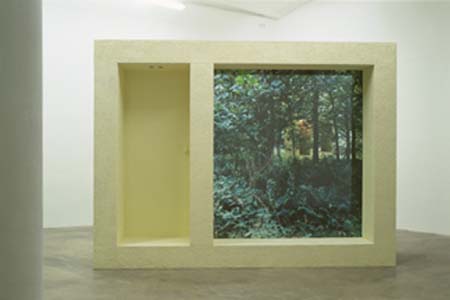Sabine Hornig
dal 31/5/2002 al 3/8/2002
Segnalato da
31/5/2002
Sabine Hornig
Galerie Barbara Thumm (old location), Berlin
A balcony is attached with its narrow side to the wall and juts out into the gallery - a barrier across the space. One can walk alongside and around the balcony and look over it out the gallery's window. Photographs of windows showing interior spaces correspond in this exhibition with the sculpture.

A balcony is installed like a sculpture in the gallery space. The balcony is attached
with its narrow side to the wall and juts out into the gallery - a barrier across the
space. One can walk alongside and around the balcony and look over it out the
gallery's window. Photographs of windows showing interior spaces correspond in
this exhibition with the sculpture.
Sabine Hornig's installations are based on existing structures or prototypes of
architecture. The sculpture "Balcony" represents a typical balcony as it can be seen
on any modernist building or Berlin "Plattenbau". It is detached from its original
setting, the exterior, transfered into the interior. The balcony is covered with stucco,
which - besides the clean, impersonal architecture - adds to its stereotypical
features, characterizing the balcony as a standard element of urban architecture. A
towel casually hangs over the balustrade.
A balcony as a space within a home projecting out into the exterior takes privacy into
public. It is a holiday idyll and an observation point. Republics are proclaimed from
balconies. And as much as the balcony is in representational architecture the
platform for the reigning and for politicians who step out to make a public
appearance, it is also the place from where the public in return had to pay
hommage to those on parade.
The interaction between interior and exterior within the exhibition is intensified by a
series of photographs showing windows. In these complex compositions again
different levels link: Although the window allows a view into an interior, this view is
distorted by the reflection of the exterior, the opposite space, that is mirrored in the
glass. Thus the gallery's walls turn into an outside facade on which the
photographic image opens a window into another space. The gallery's real window
further increases the spatial complexity of the photographs.
The sculpture as much as the photographs allow due to the transfer of a built
structure into another medium their perception as representatives of an architecture
of every-day life, of the unspectacular, that marks major parts of contemporary
urban space. The decisive elements that define a city's architecture and that clearly
distinguish its various functions are offered for analysis.
The exhibition takes place within the context of the project "Rethinking: Time, Space
and Architecture" on the occasion of the XXI. World Congress of Architecture in
Berlin. The project will be accompanied by a catalogue.
Image: Sabine Hornig, Treppenhaus, 2002, photoprint behind perspex, 151 x 235 cm
Galerie Barbara Thumm, Dircksenstrasse 41 D-10178 Berlin
opening times: tue - fri 1.00 - 7.00 p.m. sat 1.00 - 6.00 p.m.



